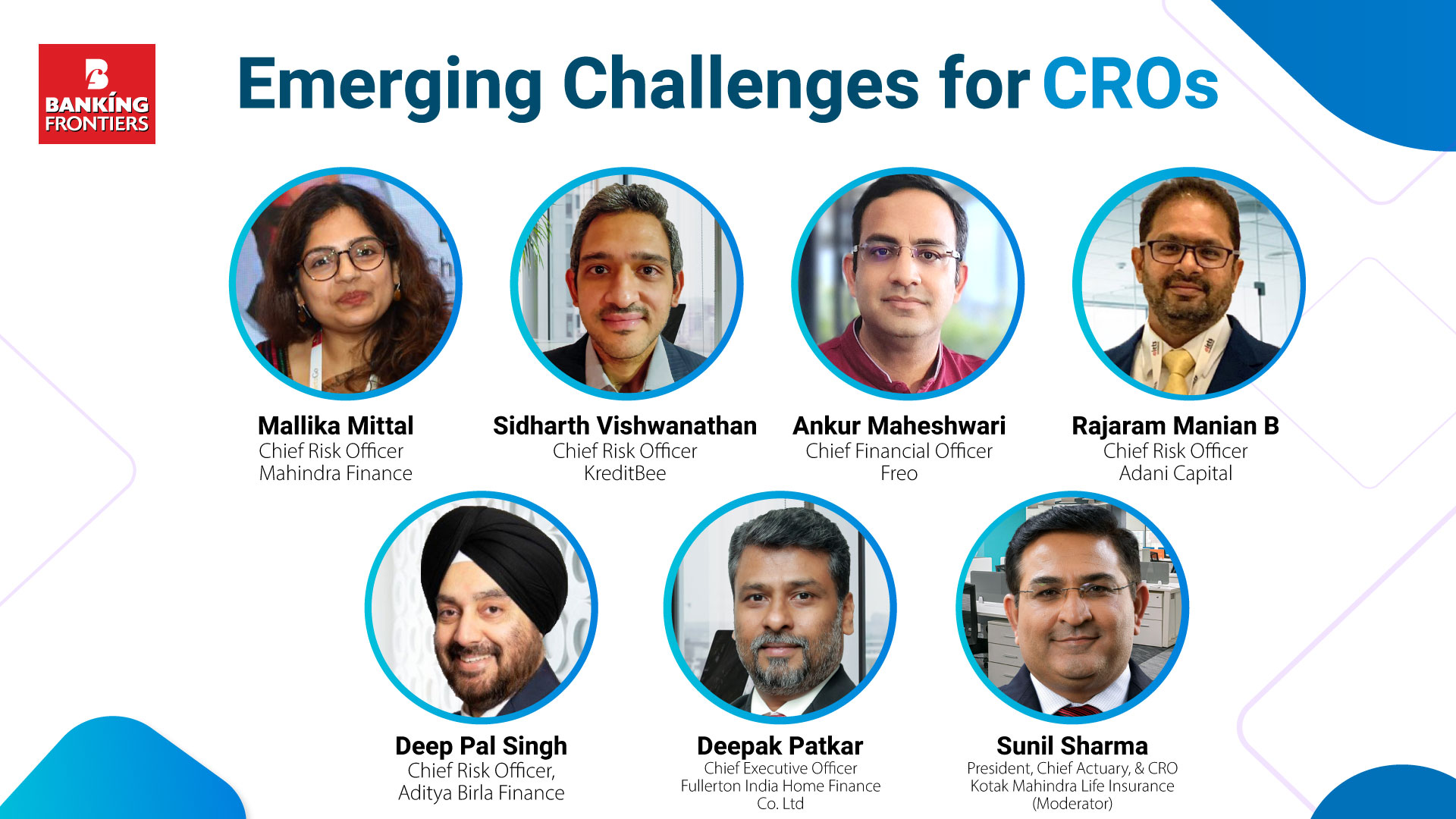CROs are burning the midnight oil in a bid to answer questions about what keeps them awake at night from the board of directors. As the economy limps back to normal post the global pandemic, CROs are penning new risk mitigating strategies. Banking Frontiers organized a panel discussion at the recently held NBFC 2022 conclave. Edited excerpts:

Panelists
- Mallika Mittal, Chief Risk Officer, Mahindra Finance
- Sidharth Vishwanathan, Chief Risk Officer, KreditBee
- Ankur Maheshwari, Chief Financial Officer, Freo
- Rajaram Manian B, Chief Risk Officer, Adani Capital
- Deep Pal Singh, Chief Risk Officer, Aditya Birla Finance
- Deepak Patkar. At the time of the event, he was Chief Risk Officer, Fullerton India Credit Company. Now he is CEO, Fullerton India Home Finance.
- Sunil Sharma, President, Chief Actuary, & CRO, Kotak Mahindra Life Insurance (Moderator)
Rajaram Manian B of Adani Capital said that the lending landscape has grown leaps and bounds over the last 2-3 years. It is easier for a risk manager to assess and evaluate the risk involved in lending. Technology has made the process of application processing, monitoring, innovating new products, and providing risk managers with the ability to monitor risk in real-time, more efficient.
According to Ankur Maheshwari of Freo: “The number of people who are doing digital transactions in India is far more than the entire US population. In fact, UPI crossed Rs11 trillion worth of transactions.”
Challenges
Even as the pandemic changed the industry dynamics, it also threw a slew of challenges against an industry that was being governed by a hawk-eyed regulator and driven by an innovative fintech ecosystem. Two key challenges – the presence of non-serious players who spoil the reputation of the market segment; and conventional players’ refusal to look at a customer-first policy are hindering the NBFC sector.
According to Maheshwari of Freo: “The convention players always offer probably what they have rather than catering to customer preferences and providing them what they require. This mindset of the conventional players must change.”
One major challenge the CROs face across organizations is data. Rajaram Manian B of Adani Capital opined that although data is a powerful tool, it must be nurtured. It is important to collect data and analyze it correctly so that it could be used across divergent functions across organizations.
According to him, the biggest challenge faced by CROs is to strike a balance between ease of doing business, the simplicity of lending, and maintaining the quality of the portfolio. With increased focus on the compliance and regulatory framework, the CRO must first design the processes, the business, and risk management.
The global pandemic changed the dynamics of the entire NBFC segment. New-age enterprises that had adopted a completely digital business model to tap new-age customers are now looking at conventional methods to lay off some of the risks. On the other hand, large enterprises dependent on conventional resources are going digital. “The pandemic not just impacted the economy, but the slowdown increased credit risks. Besides, the regulatory bodies increase vigilance on the NBFC sector to protect the interests of investors and customers. Contextually, these changes evolved the role of the CROs,” said Sunil Sharma, President, Chief Actuary, & CRO, Kotak Mahindra Life Insurance.
Return to Physical
Enterprises woke up to a new hybrid model post the pandemic. Businesses that had taken a completely digital pathway, returned to the manual processes in a gradual manner.
For instance, when KreditBee started in 2016, the idea was to come up with a completely digital business model as against the traditional scheme of things. “Our journey was probably the exact opposite compared with the others. We started on a completely digital note. We fed traditional and alternate data sources into the decisioning engine which automated rules for each customer and developed scorecards and notes on credit lines. This enabled the organization to take real-time decisions,” said Sidharth.
However, the pandemic forced businesses to change strategies. “Till March 2020, everything was great. Since the technology was homegrown, we were continuously optimizing everything digitally. Incorporating regulatory system change was centralized, and therefore, easy,” he informed.
Lockdown changed the status quo. When the government lifted it, much had changed with respect to collections. During the pandemic, most of the focus was doing digital collections. Post it, enterprises started thinking in practical terms about how to achieve maximum collections and returned to the offline way of doing business.
“We started thinking that completely digital is probably not going to fly, and that was one of the eye-opening scenarios in the sense that completely digital is maybe not the way to go. We got into the offline collections capability, and right now, we are working in a hybrid mode both from the point of view of sourcing and writing as well as from the point of view of collections and writing. Each component now has a manual component,” informs Sidharth.
Changing role of CRO
Cybersecurity, data, and the changing lending scenario post the global pandemic have also expanded the traditional role of the CROs, beyond the core of portfolio management.
The CROs are now looking at a more extensive portfolio comprising the operational, technological, capital, and liquidity risk. With ESG and sustainability becoming the new buzzwords, CROs are also focusing on reputational sustainability.
Deep Pal Singh, Chief Risk Officer at Aditya Birla Finance, said: “With ESG and sustainability, CROs are closely monitoring reputational risk, data privacy, data breaches. The canvas of a CRO expands beyond onboarding customers, transactions, servicing, and the traditional line of credit, compliance and conduct.”
Citing an example of the transformation at Aditya Birla Finance, he said the company was a trendsetter as it opted for an online business model before covid-19, using technology to determine and sanction loans in an unsecured retail segment.
“Considering that the entire technology suite was homegrown, we had a lot of control with respect to how we could launch new products. But the status quo changed in March 2020, after the first lockdown, and we started thinking about offline collections to build and develop new capacities. We are presently working in a hybrid mode that includes e-KYCs and some manual interventions.”
Drawing parallels between the global pandemic and the global slowdown in 2008, Mallika Mittal, Chief Risk Officer, Mahindra Finance, said: “The retail segment boomed in 2008; changed the regulatory landscape, and yet the world faced a global slowdown. Though the growth was uncontrolled, it was not managed properly, and the crisis hit the markets! The regulators introduced Basel III Accord as a new regulatory guidance.”
Similarly, during the pandemic, some of the substantial changes that overtook the traditional outlook of business included the digital push, work from home, tighter compliance norms, and the focus on the CROs as enablers to drive the change. “We must learn the new ropes. The gamut of modern technology, new regulatory requirements, and the mandate on the NBFCs to appoint CROs, inclusion of NBFCs into the Basel III Accord, are the right drivers of change,” she said.
Explaining the significance of these measures, she said: “Whatever risks that you are taking, be it in whichever area you are in, you are taking credit risk, you are taking an operational risk, you are taking markets risk. Whichever risk you are taking ties back to your capital adequacy.”
She said that even though technology is at the forefront of all businesses, the role of risk is critical. “As a CRO, you must lead from the front; you are no more a risk person; you are no more just a governor; you must guide the organization, and this is your risk appetite. You must move away from being a watchdog to beingan enabler.”
Deepak Patkar, Chief Executive Officer, Fullerton India Home Finance. focused on the role that CROs are evolving into at the board level. Musing on the fact that the board of directors call upon the CROs to mitigate not just lending risk, he said: “How are we mitigating cybersecurity and data security? These are the major risks that every board member is asking CROs?”
____________________
Read more-





